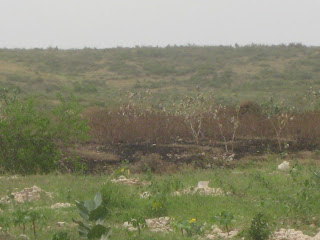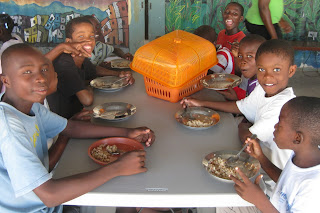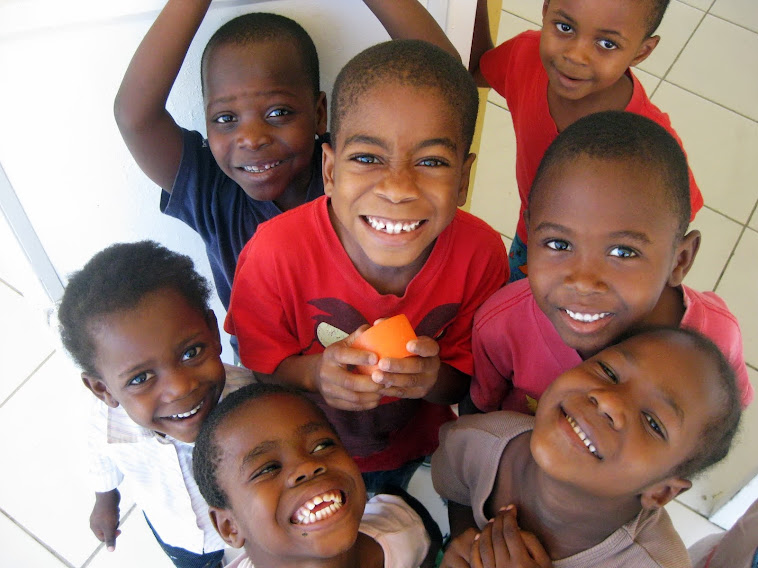Blogging is a challenging task for me – I must thank all of you who have conveyed such encouragement of my writing, and I have often thought that I express myself better in writing than in spoken word. But the monumental task of communicating the thousands of moments in a series of days within just a few paragraphs is becoming more difficult, and by the length of many of my posts, you can easily see that I fail at it! There are moments, or hours, which hold me hostage as I wonder how I can ever capture this experience and write about it, because it is so unique. I found myself near tears this morning because I just wanted to share these moments with someone in person, to allow a glimpse into this life beyond the written page and the pictures. Living this experience alone is both a gift and a challenge, stretching me in every possible way. I pray that I am diligent and apt for the task each day.
The week began quietly, with yours truly indulging in the joys of two long-awaited care packages, one full of protein bars and fruit leather, the other containing such feminine essentials as several shades of nail polish, remover and cotton balls, and most importantly, dark chocolate-covered espresso beans. Evening mass on Sunday, a few episodes of Modern Family, to which I was introduced by Dani, and preparation for the new stretch of days. I am a firm believer that we are given the grace to sustain us for today's moments, and that when tomorrow arrives, the grace for tomorrow will arrive with it. I have had to consciously choose to believe that in recent weeks, but the gift of living in the present moment has been a huge amount of grace in itself. I am a planner, so the wheels are constantly turning in my head, but when working with children, in a culture that changes moment-to-moment, it is hard to find any productiveness in worrying about how life will be months from now. So I have tried to remain present to each moment as I walk into the FWAL complex, praying for the grace to embrace whatever I am greeted with as the day progresses.
After 10 weeks of wearing scrubs and a t-shirt to the clinic every day, I was challenged by one of the nurses to wear a skirt. The exact conversation was, Nurse: “Brigitte, you wear pants every day. Do you not like skirts? Do you have any skirts?” Me:“Yes, I have skirts! I like skirts! But it is so dusty every day and I get so dirty that I wear pants.” Nurse:“Well, you have to wear a skirt on Monday. You need to wear a skirt on Monday.” So, needless to say, the reaction to my arrival in a skirt on Monday was absolutely priceless. I got compliments from everyone, from the nurses to the maintenance staff, to the drivers, to the doctor, to the madames and mettres who work with the kids, to the kids themselves! I was a bit taken aback, because though I appreciated the compliments, I wondered what the heck they were thinking for the first two-plus months I was here! I decided to prolong the experience, and received the exact same response on Tuesday as Monday. (Wearing a different skirt, for the record). Then when the inevitable happened, and I returned to wearing scrub pants, one of the drivers was quick to point out to me, “Brigitte, you are not beautiful today, because you are not wearing a skirt.” The guy is not known for his tact.
I am constantly reminded of the immense poverty here. However, living in the midst of it on a daily basis, I am afraid of adopting a “routine,” or almost numbed attitude about it, shrugging off the beggars on the street or yet another picture of a tent-dwelling family. The problem is so overwhelming that perhaps it seems easier to look past it or click to another website. But this is real life, with no escape for those living it. Poverty has many faces, and when I look into the eyes of the worker at the school who was widowed four years ago, is trying to provide for her nine children, and has forgone breakfast every day for countless days, and is vomiting bile in the courtyard, I see suffering. She trudges back and forth, dozens of times each day, carrying heavy water jugs on her head and delivering safe drinking water for the 200 kindergartners. Wearing her best clothes, sweating in the seething heat, she collapsed on the stones as her stomach retched with hunger. She refused food but allowed me to give her a drink of cold water as she sat in the shade. She would not sit for long, and was up again working within minutes. She returned to the clinic door Monday morning, and talked of the anxiety she feels, her inability to sleep at night out of concern for her children and continued grief over her husband's death, and the pain in her abdomen from hunger. What can I do in this moment, when I know this is one of countless stories here, and that the suffering is beyond comprehension for so many? I can look her in the eye, I can listen, I can validate her feelings, and I can encourage her to continue being the beautiful mother that she is. I can allow her to speak, I can offer her cold water, I can give her medication for the acid in her stomach, and I can pray. I cannot rescue her from her current situation, but I can stand next to her and share in her pain for a few life-giving moments.
Wednesday the country of Haiti celebrated the “Day of the Dead,” known in English-speaking countries as All Souls' Day. This is the day in the Catholic church that is dedicated to prayer for the souls who may not have made it to Heaven yet, and is spent in intercession for God's mercy on their souls, that they may be reunited with Him. The “Day of the Dead” is a term used much more for the voodoo culture here, as people here ask the Loa who guards the gate of the spirit-world to allow their relatives and ancestors into it. This date has had added significance since the earthquake. The preparation of the body and the funeral for the deceased has tremendous weight to it here, and there are specific customs associated with the preparation and burial of the dead. When thousands of bodies were collected and buried in mass graves, there was no time to complete these customs, and there was no way to know where the body of a loved one now rested. So there is an unsettled feeling to the day.
 |
| One of the Missionaries of Charity, praying at the graves at Titanyen |
 |
| The sky over Titanyen |
 |
| Fr. Rick has marked some of the graves with crosses |
 |
| The mass graves from the earthquake and cholera are close by |
NPH has made a tradition of having a special mass for the dead on All Souls' Day, and in the mid-afternoon, a large group of us drove out to Titanyen, the current mass burial ground used by the government, where the mass graves from the earthquake and the cholera outbreak are located. Fr. Rick and several staff make the journey to this land every week, collecting the unclaimed bodies from the general hospital and giving them a Christian burial. It is an experience in which all volunteers are invited to participate at least once throughout our service, a crucial lesson in honoring the body in all stages of life, and even in death. The land at Titanyen is an exquisite final resting place – rolling hills and soft breezes greeted us as we arrived. Crosses mark some of the NPH graves, mounds of freshly-moved stones and soil cover the newest ones. The Sisters of Charity joined us as we sang and prayed and celebrated God's own sacrifice for us, His understanding of our grief, and the mercy with which he loves. The sky was breathtaking, and a rainbow appeared as communion was prepared and distributed. It was a unique paradox – the violence and horror of sudden death and disposal, met with peace, the beauty of nature and a contingent of Haitians and foreigners alike who are determined to live with joy.
As I entered the clinic yesterday morning, the nurses smiled at me. I greeted them, and then they watched as I stood and listened to their conversation. They both turned to me, and one of them complimented me on my t-shirt. (Purple, thanks April!!) Then, one of them asked me, “Mis Brigitte, (Nurse Brigitte), do you like Haiti?” My response was a resounding “yes,” to which she then said, “We know. Haiti is making you more beautiful.” As I stumbled to reply to her with my gratitude, I added yet another intention to my prayer list. Lord, please give me the grace to aspire to deserve this compliment!
 |
| Fabienne, a recipient of our Nutrition Program |
 |
| 50 kids now get an extra, high-calorie, high-protein meal loaded with vitamins | and minerals! |













